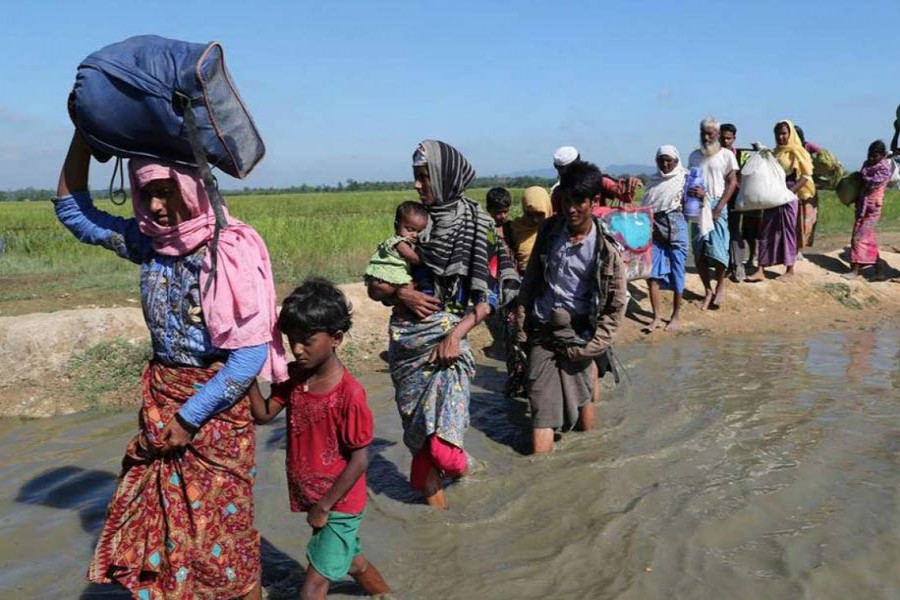Bangladesh has been able to “successfully internationalise” the Rohingya issue in the outgoing year and will keep focusing on having a sustainable solution to the problem capitalising on the mounting global pressure on Myanmar on accountability front, officials said.
Bangladesh raised the Rohingya issue in all international forums round the year – 2019 – seeking a genuine pressure on Myanmar which has “failed” to build a confidence among Rohingyas and ensure a conducive environment in Rakhine State for the safe return of Rohingyas to their homeland, according to the officials said.
“It’s a problem rooted in Myanmar. Its solution also lies there. We’ll keep focusing on the issue (in the coming year) to find a sustainable solution engaging the international community,” an official said recognising the significant development on accountability front.
Though there have been pledges and efforts from the international community to resolve the crisis in a sustainable manner, not a single Rohingya has so far been repatriated.
Bangladesh stands ready to begin Rohingya repatriation and will remain engaged bilaterally and internationally keeping focus on the issue in the coming year, the officials said.
Apart from the repatriation issue, relocation of Rohingyas to Bhashan Char was a much-talked-about issue in the outgoing year.
Bangladesh says Rohingyas will have a better living in Bhashan Char once relocated there reiterating that it "will not force" any of the displaced people to avail of the relocation opportunity.
"We wanted to avoid the risk as they (Rohingyas) die in landslides in the crowded camps. They'll have a better living if they go there (Bhashan Char)," said Foreign Minister Dr AK Abdul Momen.
Bangladesh wants to see the Bhashan Char issue be mentioned in the Joint Response Plan (JRP) 2020 in a significant way.
The UN agencies and other partners are now working on the Joint Response Plan (JRP) 2020 to raise funds for Rohingyas which is likely to be presented in Geneva in February next.
The government has a plan to accommodate 100,000 Rohingyas in Bhashan Char, which is ready now for living, as newly-built shelters will offer educational and livelihood options and help decongest the present camps.
The cluster in Bhashan Char comes with multi-storey buildings, a typical model that is hugely successful in coastal belt.
Bangladesh has so far handed over names of over 1 lakh Rohingyas to Myanmar authorities for verification and subsequently is expediting their repatriation efforts but Myanmar is yet to take back its nationals from Bangladesh, according to the Ministry of Foreign Affairs here, reports UNB.
The 3,450 Rohingyas who have been verified by Bangladesh and Myanmar, the Hindu Rohingyas and those living along the “zero-line” are prioritised groups for early repatriation.
The UN says the return to Myanmar must be voluntary, safe, dignified and, importantly, sustainable, so that the decades-long cycle of displacement is finally broken.
The government of Myanmar has committed to creating conditions conducive for return, including through bilateral agreements with the government of Bangladesh and under a tripartite Memorandum of Understanding with UNHCR and UNDP, but “did not” implement its commitment yet.
Bangladesh is currently hosting over 1.1 million Rohingya people in Cox’s Bazar district, and most of them arrived here since August 25, 2017.
Tripartite Efforts
Bangladesh, China and Myanmar are in discussion to encourage the commencement of the Rohingya repatriation process.
The tripartite joint working group is likely to hold its next meeting in January next year for further discussions on early repatriation of the Rohingyas and for an early date of return to their homeland, an official told UNB.
The establishment of tripartite joint working mechanism is led by the Ambassadors of China and Myanmar to Bangladesh and DG of Myanmar Wing of Ministry of Foreign Affairs of Bangladesh.
The tripartite joint working mechanism is aimed at delving into technical and operational difficulties in the repatriation process through “candid and frequent” discussions.
A common ground has been “successfully identified” during the first meeting of the joint working mechanism, said the Chinese Embassy in Dhaka.
Hopes on Accountability Front
Bangladesh is expecting good results on accountability front in the new year as the top UN court - International Court of Justice (ICJ) heard the genocide case filed by The Gambia against Myanmar.
The hearing was held at the Peace Palace in The Hague on December 10-12 the UN court was asked to accord provisional measures to bring relief to the Rohingya community and end the prevailing culture of impunity of the perpetrators in Myanmar.
On November 11, The Gambia filed a case with the United Nations’ highest court, accusing Myanmar of committing “genocide” in its campaign against its Rohingya Muslim minority.
Bangladesh appreciated the accountability efforts at the ICJ lodged by The Gambia on crimes committed on Rohingyas allegedly with genocidal intent by Myanmar.
Bangladesh also underscored complementarities between accountability and creation of an atmosphere conducive to sustainable repatriation of Rohingyas.
“We’re confident the court will urgently and appropriately respond to the situation,” said Matthew Smith, Chief Executive Officer at Fortify Rights.
“Myanmar authorities are defiant and continue to violate the rights of the Rohingya. These ongoing violations aggravate the issue of genocide before the court and require urgent action.”
New evidence indicates how Myanmar authorities are using Rohingyas for slave labour, including child slave-labour, systematically restricting freedom of movement, and denying the existence of Rohingyas and their right to a nationality, according to Fortify Rights.
In 2017, Myanmar’s military, police and local militia burned Rohingya villages, “systematically shot and killed” Rohingyas and committed acts of sexual violence and rape – used as a weapon of war – against women and girls.


